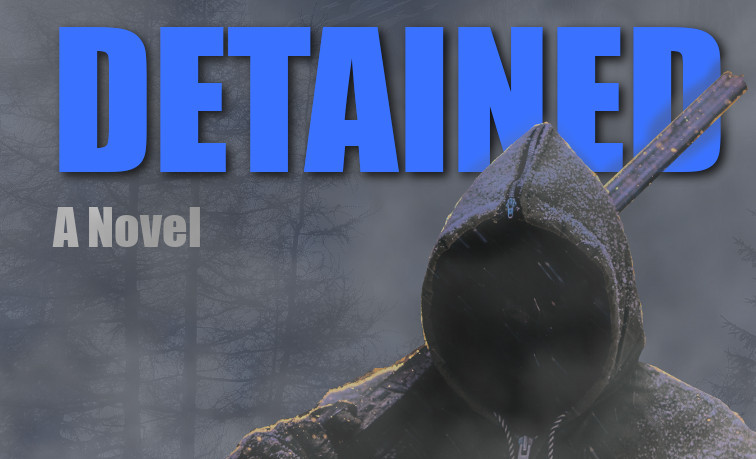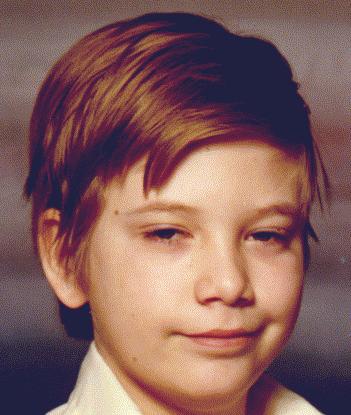Detained Chapter 32

I’ll be posting one chapter of my novel Detained every week throughout 2021. Download links below.
32. Candace
Sitting in the backseat with Jimmy Haggen was like time-traveling backwards ten or fifteen years. She half expected to look down and find herself wearing the pale gold prom dress she’d somehow convinced herself was the height of fashion in her youth. Except they weren’t in the world’s grossest rented limousine, a soggy boat that stank of other parties, other mistakes, and Jimmy wasn’t already red-faced drunk and disinterested in her, cold and distracted, and they weren’t crammed in with two other couples in equally disastrous fashions and states of sobriety. With her thigh pressing against his, though, the memory was persistent, and she remembered—with incredible specificity and clarity—how badly she wanted Jimmy that night, how determined she was to end the magical evening with him on top of her, inside her, doing everything they could think of.
Adding to the surreality of it all, they were headed to a midnight rendezvous with her old Phys Ed teacher, Mr. Eastman, a man who’d been a rotund, bespectacled pudge fifteen years ago and who was now retired and, she imagined, sitting around Jack’s every night hunting for people who hadn’t heard his war stories about unruly, disrespectful kids, the horrors of the Designated Hitter Rule, and why the federal government technically had no authority to collect taxes.
As she recalled, for a man who never broke a sweat in her eyesight, Glen Eastman had been quite the armchair sportsman, and had often walked around wearing an old fishing vest despite having never been on the water in his life.
She studied the back of Mike Malloy’s head. On top of everything else—remembering things and people that had never happened, a strong feeling that she’d been wasting time and sitting idle for six years and only now were things sliding back into place—she’d never felt so instantly comfortable with someone before. Five years ago—three, if she was being honest—she would have thought something terribly clichéd and boring like love at first sight or soul mates or something awful like that—not seriously, maybe, but sort of. Now she wondered if it was just an alternate reality she could still almost reach out and touch, a life that had been surgically removed from her through, of all things, mathematics.
Fucking math, she thought. I always knew math was out to get me.
She wondered if that was what love was, or at least the soul-matey movie kind people sometimes swore they found. Maybe love was just people who’d shared an aborted reality, suddenly running into each other on the street and realizing that this, this was what they should have been doing all this time.
Whatever else, whether she believed what was happening or not, this much she knew: She was supposed to be in this car with her first boyfriend and Mike Malloy.
One-Eyed Jack’s was lit up and loud when they pulled into the parking lot, which was disorienting. She’d worked there for years and every night had been Tuesday night, largely quiet and empty, with the only music what the old, cranky jukebox provided. But here was One-Eyed Jack’s pulsing with life and noise. As they got out of the car and approached the familiar building out in the middle of nowhere it was achingly familiar and completely different all at once, a place she knew better than any other in the world except maybe her father’s house, and yet it was the polar opposite of her experience.
At the door, they were stopped by a burly guy she didn’t recognize, a shaggy dog of a man wearing reflective Aviator sunglasses at night, wearing various pieces of denim, his long, greasy hair in his face, chains and other unnecessary accouterments hanging from his pants and jacket.
“Sorry, guys,” he said. “We’re at capacity.”
Candace was about to push past Mike and demand to see Jack McCoy when Phil Eastman appeared at the door. He wasn’t wearing his usual fishing vest; instead he had on what looked like an all-black jogging suit, his eyes bulging behind his thick glasses. He moved with an air of assurance, though, that she didn’t remember. Instead of the slightly ridiculous former teacher who’d been the World Record holder for Least Athletic Physical Education Teacher, here was an older man who moved with a confidence and assurance she didn’t recognize.
“It’s all right, Benji,” he said, clapping Denim Man on the shoulder. “They’re with me.”
“Okay, Mr. Eastman,” Benji said, grinning and sweeping his hand towards the door. “Go on in!”
Candace blinked. She knew Benji—Benjamin Louhy. She’d been one year ahead of him in school, and while they’d never been friends they’d had a dozen conversations over the years. She hadn’t seen him since she left town, and as she floated past him between Jimmy and Mike, she felt paralyzed: Certain he would recognize her, unwilling to take the first step.
“Hey, Jim,” Benji said. “Sorry about that.”
“No worries, Benj,” Jimmy said cheerfully. “We’re probably gonna end up burning this place down tonight, anyway.”
Inside, she felt dizzy. The aisles between the wobbly tables she’d once swanned through like a boss were jammed with people. Every table was taken, and people were standing everywhere. A makeshift stage had been built in one corner, a tiny triangle of raised floor, and a three-piece band was knocking out some pretty decent country-flavored rock. No one was dancing. Most amazing of all, there were two waitresses working the shift, something she’d never experienced in all her years living in the area and working there. It blew her mind.
Everyone, she noticed, was wearing black.
Once she noticed it, she couldn’t unsee it: Every single patron, including Glen, was wearing a black ensemble. It was a sea of hipsters, and she had to suppress a sudden urge to giggle at the thought: Somehow, under her radar, Jack’s had become the new hip place, and people were driving in from miles around to check it out. The thought was so hilariously unlikely she didn’t know how to deal with it.
“Come on,” Glen said. “I have a table.”
They sat down at one of the refreshingly familiar old tables, heavily varnished wood that had been carved and water-stained so often it was like a rock formation. One of the waitresses, an unfamiliar woman with bleached hair and a layer of foundation that didn’t quite hide the rash of pimples all over her cheeks, came over and slapped down some napkins.
“What can I get y’all?” she shouted.
Candace had the tingling, buzzing sense of deja vu, and then Mike leaned forward and held out a black credit card. She heard the words 1955 Glenfarclas before he shouted “You’ve got a 1955 Glenfarclas behind the bar!”
She blinked, taking the card with an air of wonder. “We do?”
He nodded. “Bring the bottle, four glasses, a bowl of ice, four glasses of water!”
The band swung into a frenzied climax, and with an A power chord and a smash of drums they were done. There was applause that felt kind of polite and rote, and then the volume dropped to a low roar. She felt drunk. She’d packed up and come home because of a persistent subconscious sense of wrongness in her life. And now she was here with her high school boyfriend and a stranger she wanted to tell secrets to and her old teacher. The least successful bar in history was packed to the rafters and yet as she watched, none of the black-clad customers seemed all that interested. And as she looked around, she noticed something else: None of them were drinking.
They all had drinks. Pitchers of beer, filled glasses, bottles. But no one picked anything up as she watched. No one even touched the glasses, and the beer all seemed flat and warm to her professional eye. She’d spent her whole life monitoring bars, after all. There was so much off in Jack’s she couldn’t even come up with what bothered her the most.
“Glen,” Mike said, “why not fill Candace in on what you’ve been up to?”
Glen Eastman nodded and smiled at her. She blinked, seeing him with his hands ziptied behind his back.
“Candy, how are you, sweetheart?” Glen said, smiling warmly. “I suppose you’re like the rest of us—been feeling and seeing things that seem like they happened, but can’t remember anything actually?”
She nodded, feeling overwhelmed. It was like everything she’d ever known in her life had been changed, flipped.
“Jimmy and I’ve been discussing that for years now. And after a while, we decided we weren’t crazy—believe me, we considered the possibility pretty seriously. But I suggested to Jim, if we’re crazy, then we’re crazy. No harm then in doing a little investigating. We had these … visions, I guess. A life never led, people and events that hadn’t yet happened. So, I suggested we take those things seriously on a contingent basis. Let’s do our research. Find out if the faces we each remembered, the bits and pieces, linked up to something that actually existed.”
“We found it it all did,” Jimmy said.
“For the last few months I’ve been posted up in a deer blind across from that old factory,” Glen said, smiling. “Just me and some binoculars and a phone. And two months ago, this one showed up with a crew.”
He pulled his phone out of his vest pocket, thumbed it, and turned it around for her to see.
She recognized the face. It was in Jimmy’s notebook, an older man, angry-looking, wearing glasses. She knew the face, even though she’d never seen it before.
Glen nodded. “Me too. We all remember him. He showed up with two tractor trailers full of equipment and a swarm of people. They began working on the place like crazy, and a few days later, she showed up.”
He thumbed the phone and held it out again. Candace recognized the woman, too; older, fierce-looking, with a short military-style haircut and a piercing stare.
“You recognize these people, too, I can tell.” Eastman said. “Me and Jimmy, we weren’t sure what to do, and then Mr. Malloy showed up, like an old friend we couldn’t neither of us remember.”
“And Mr. Malloy had a plan,” Jimmy said.
Candace felt her stomach dropping. She looked at Mike. She had a feeling that everything was about to come together and make a little more sense. She also had a feeling she wasn’t going to necessarily like it.
The waitress returned, carrying a tray with the bottle of Scotch, four glasses, ice, and water. Candace admired her technique as she set everything up; the girl had some experience, she thought, and knew how to handle herself. When she’d finished laying everything out she stood up and, to Candace’s amazement, did something that could only be described as a little curtsy, bending her legs and nodding her head.
“Y’all let me know if you need anything else,” she said, and spun away.
Guess she doesn’t see too many black cards in here, Candace thought sourly, then hated herself. Guess you haven’t either.
When the waitress was gone, Mike leaned forward, his eyes locked on her. She liked his eyes, but there was something in his expression she didn’t like, though she couldn’t put her finger on what it was, precisely. Something haunted.
“We’re not going to sit here and wait for it to happen again, for them to come and grab us,” Mike said. “We’re going to take the facility. Pre-emptive. We’re going to take the lot of them, and take possession of their little Reality-bending machine.”
She blinked. Then she shook her head. “That’s crazy. You remember the same things I do. They have soldiers there. Assault weapons. God knows what we didn’t see.” She looked around and leaned forward. “Mike, we can’t take the facility. We don’t have the resources.”
Mike shook his head. “You’re wrong, Candace. Me and Jim and Glen, we’ve been planning for this.”
“Candy,” Jimmy said, picking up the bottle and pouring himself a generous drink. “Take a look around. All these people in here? Every single one of them? Work for our rich benefactor here, Mr. Mike Malloy.”





